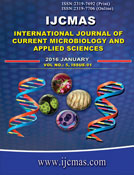


 National Academy of Agricultural Sciences (NAAS)
National Academy of Agricultural Sciences (NAAS)

|
PRINT ISSN : 2319-7692
Online ISSN : 2319-7706 Issues : 12 per year Publisher : Excellent Publishers Email : editorijcmas@gmail.com / submit@ijcmas.com Editor-in-chief: Dr.M.Prakash Index Copernicus ICV 2018: 95.39 NAAS RATING 2020: 5.38 |
Neonatal sepsis is a clinical syndrome of bacteremia characterized by signs and symptoms of systemic involvement during first month of life. It is a common cause of morbidity and mortality in full term and preterm neonates. The microorganisms and their sensitivity pattern vary from region to region and time to time. The current study was conducted to know the pattern of Gram Negative bacterial organisms at a tertiary level hospital and their response to commonly used antibiotics. This descriptive study was conducted at Department of Microbiology, Sri Guru Ram Rai Institute of Medical and Health Sciences (SGRRIM&HS), Dehradun (Uttrakhand) from January 2014 to January 2015. Blood Samples were collected from neonates admitted in the Neonatal Intensive care unit (NICU) of Sri Mahant Indresh Hospital (SMI), Patel Nagar Dehradun. Blood was taken from 550 neonates admitted to Special Care Baby Unit fulfilling criteria for neonatal sepsis. The clinical and laboratory data was recorded. A total of 550 blood cultures were taken and culture positivity was seen in 102 cases (18.54%). Klebsiella pneumoniae was the most common organism found in 27(50%) cases, followed by Escherichia coli in 14 (25.93%). Maximum (100%) resistance was seen in Klebsiella pneumoniae for Amoxi-Clav (AMC), Cefotaxime (CTX), Ceftazidime (CAZ), Amikacin (AN). 100% resistance for Amoxi-Clav (AMC) was also seen in E.coli however for Ceftazidime the resistance was 92.85% Neonatal sepsis is a leading cause of neonatal admissions, morbidity and mortality in developing countries. Drug resistance is one of the emerging issues especially for routinely used antibiotics as found in our study.
 |
 |
 |
 |
 |